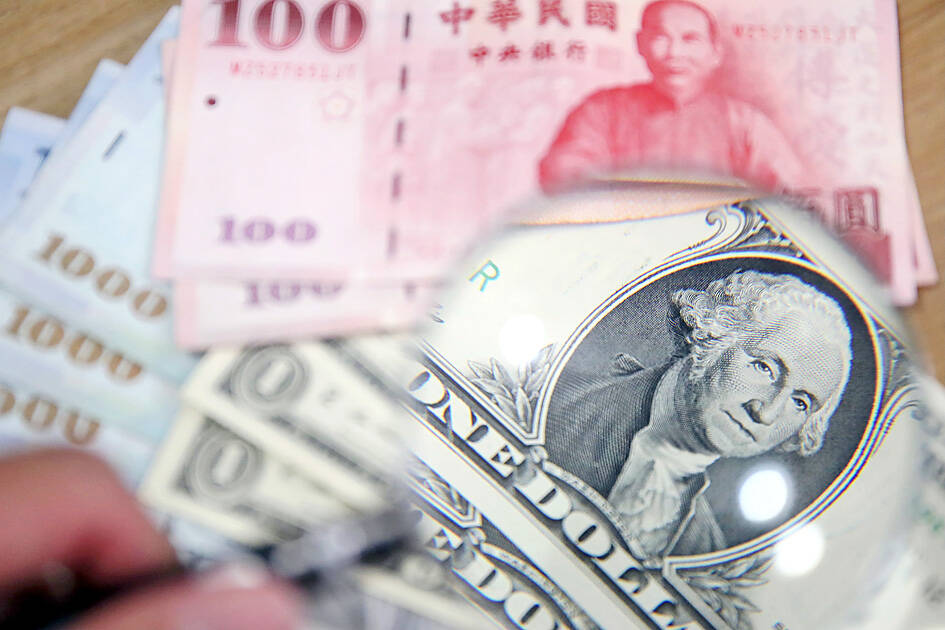The worst could be over for the New Taiwan dollar as China’s economic recovery and a rebound in the chip industry will support the beleaguered currency, analysts said.
The NT dollar is on course to weaken for a sixth month, the longest stretch since 2006, after foreign funds turned sour on its technology sector and risk sentiment deteriorated on slower growth in China.
The tide seems to be turning now on nascent signs of stabilization in China’s economy — its biggest trading partner — following policy boosts. The yuan emerged as the best-performing Asian currency last week, followed by the Japanese yen and the NT dollar.

Photo: CNA
The outlook for semiconductors might also provide tailwinds to the currency as Taiwan is home to the world’s biggest chipmaker, Taiwan Semiconductor Manufacturing Co (台積電).
“Improved China economic prospects and a turnaround in the chip cycle should be positive for the [New] Taiwan dollar,” said Eddie Cheung (張敬勤), senior emerging markets strategist at Credit Agricole CIB in Hong Kong. “The capping of the yuan and the pullback in the [US] dollar should act to restrain [New] Taiwan dollar weakness in the near term.”
He estimates the NT dollar would strengthen toward NT$31.1 per US dollar by December. It dropped to a 10-month low this month before paring losses to close at NT$31.978 yesterday.
Foreign inflows returned to Taiwanese stocks last week following stimulus measures in China, which accounts for about a quarter of its total trade. Blockbuster earnings from US chipmaker Nvidia Corp have also sparked hopes of a boom in the tech sector, and Taiwan being the world’s largest chip exporter could benefit from it.
Yet risks remain due to some skepticism over the chip industry’s rebound and geopolitical factors, with Taiwan warning that China is ratcheting up its military pressure.
Investors will now be focused on the nation’s central bank rate decision on Thursday for any cues on the interest-rate path and further support for the local currency.
Technically, the NT dollar has support at its low for last year of NT$32.345 to help stem its decline. Bank of America Corp does not see it breaching that level and predicts the currency would end the year at NT$31.7 versus the US dollar.
“This forecast is largely a combination of moderating [US] dollar strength as we approach the end of the Fed-hiking cycle and our expectation of more meaningful fiscal response by the mainland Chinese authorities to counter the trend of weakening growth,” Bank of America strategist Cheung Chun Him (張駿謙) said.

When an apartment comes up for rent in Germany’s big cities, hundreds of prospective tenants often queue down the street to view it, but the acute shortage of affordable housing is getting scant attention ahead of today’s snap general election. “Housing is one of the main problems for people, but nobody talks about it, nobody takes it seriously,” said Andreas Ibel, president of Build Europe, an association representing housing developers. Migration and the sluggish economy top the list of voters’ concerns, but analysts say housing policy fails to break through as returns on investment take time to register, making the

NOT TO WORRY: Some people are concerned funds might continue moving out of the country, but the central bank said financial account outflows are not unusual in Taiwan Taiwan’s outbound investments hit a new high last year due to investments made by contract chipmaker Taiwan Semiconductor Manufacturing Co (TSMC, 台積電) and other major manufacturers to boost global expansion, the central bank said on Thursday. The net increase in outbound investments last year reached a record US$21.05 billion, while the net increase in outbound investments by Taiwanese residents reached a record US$31.98 billion, central bank data showed. Chen Fei-wen (陳斐紋), deputy director of the central bank’s Department of Economic Research, said the increase was largely due to TSMC’s efforts to expand production in the US and Japan. Investments by Vanguard International

WARNING SHOT: The US president has threatened to impose 25 percent tariffs on all imported vehicles, and similar or higher duties on pharmaceuticals and semiconductors US President Donald Trump on Wednesday suggested that a trade deal with China was “possible” — a key target in the US leader’s tariffs policy. The US in 2020 had already agreed to “a great trade deal with China” and a new deal was “possible,” Trump said. Trump said he expected Chinese President Xi Jinping (習近平) to visit the US, without giving a timeline for his trip. Trump also said that he was talking to China about TikTok, as the US seeks to broker a sale of the popular app owned by Chinese firm ByteDance Ltd (字節跳動). Trump last week said that he had

STRUGGLING TO SURVIVE: The group is proposing a consortium of investors, with Tesla as the largest backer, and possibly a minority investment by Hon Hai Precision Nissan Motor Co shares jumped after the Financial Times reported that a high-level Japanese group has drawn up plans to seek investment from Elon Musk’s Tesla Inc to aid the struggling automaker. The group believes the electric vehicle (EV) maker is interested in acquiring Nissan’s plants in the US, the newspaper reported, citing people it did not identify. The proposal envisions a consortium of investors, with Tesla as the largest backer, but also includes the possibility of a minority investment by Hon Hai Precision Industry Co (鴻海精密) to prevent a full takeover by the Apple supplier, the report said. The group is